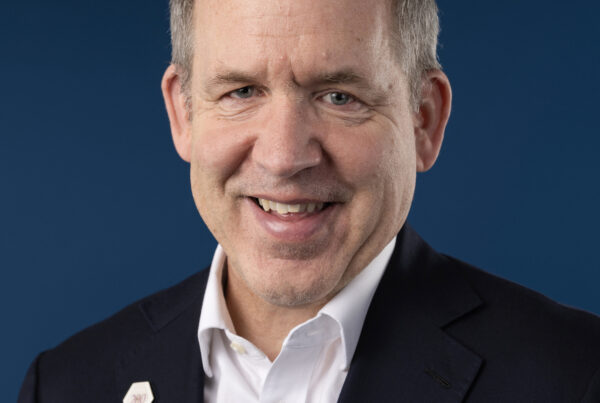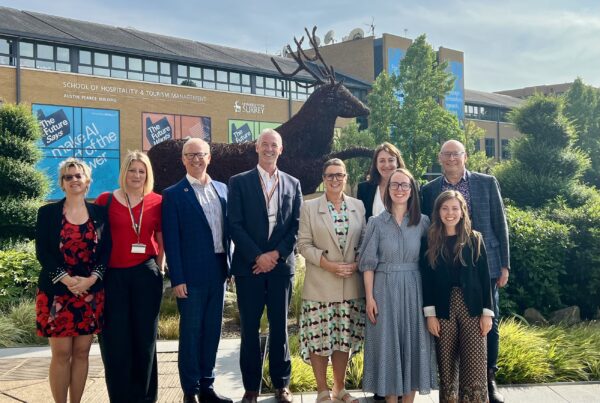Imagine a university that…

Author: Martin Betts | As seen in Campus Review
Imagine a university taking advantage of this seismic disruption triggered by a global pandemic to not tweak, but completely transform, how it provides student experiences.
Imagine that this transformation allows social and soft skills to be enhanced to an unparalleled extent by competitors. Imagine that graduates from this university develop a reputation for being immediately employable, high performing, and become sought after by employers. Imagine the university being relentlessly focused on this point of differentiation such that it builds systems, culture, processes and infrastructure focused on this point of difference.
And imagine it promotes that reputation through a brand essence that translates into experiences of students, staff, employers and parents that has everyone taking notice.
Imagine what it would mean for the position such a university would hold in a disrupting higher education marketplace. What its impact would be with current and potential external partners. And with future students making their decisions of where they would prefer to study. And then imagine what research would be possible at such a university.
Have we just imagined the university of the future? One that will thrive in a post-pandemic world. Why don’t we create it?
The focus of most universities over the last 20 years has been seeking scale, building research reputation, and improving in rankings. Those rankings have driven international student demand. They have maintained and reinforced the views of some in the sector, and past graduates, that there are real universities, and there are new pretenders.
What has this meant to the student experience? Universities have grown to have more than 50,000 students in some cases. Staff hired as passionate teachers from the professions have been expected to become aspiring researchers. The student experience has increasingly become one of being lost, and forgotten. Have we learnt to treat our students as a source of income to feed the priority agendas of research and campus development?
What difference has research maturity and campus real estate made to what students do? Is what they do what they seek? My sense is that, more than anything, they seek interaction with great minds and new friends, and access to a job. The university they are part of may have employed the leading minds in their areas of research prowess, but the chance of a student seeing them is slight.
The campuses may have looked great at the ministerial opening and will appear fantastic on websites and on open day. But students are looking for interactions with people, who talk with them, rather than architectural tours and distant associations with research superstars.
What of the digital infrastructure and its impact on student experiences? We are good at developing that too, right? Try asking students if they believe that. They are used to customer experiences on platforms like Uber, Airbnb and Spotify. We are light years behind with our multiple authentications and tortuous routes to functionality as a symptom of the risk and compliance-dominated bureaucracy we appear unable to escape from. And we have allocated too much of our capital into physical rather than virtual infrastructure.
How many university leaders at the end of 2020 wished they had spent more money over the last 10 years on real estate, and less on digital?
What is leading to people getting well-paid jobs as graduates in 2021? Is it a degree from the “best” place? And does “best” correlate most with the rankings, or with the quality of the student experience? Well Charles Sturt University has the highest rate of graduate employability in the country. And graduates of the University of Southern Queensland get paid more than graduates from anywhere else. And, in Victoria alone, the highest ranked university for both graduate employment and pay is Federation University. The correlations with research rankings are non-existent.
The truth is that employers, and those assisting them seek talent, place very little store by which university a potential employee attended. They certainly care little about its research reputation. Most still use the possession of a degree as a means of shortlisting candidates, for now. But they make final selection decisions based on skills, particularly soft skills and social aptitude, rather than grades and technical expertise. They certainly do not appoint based on the research reputation of the awarding institution.
Many of these issues came to the fore in last week’s HEDx podcast where CEO Lloyd Lazaro of the leading firm of search consultants, The Executive Chair, shared insights into what is happening in the graduate and leadership hiring world.
So, let’s get back to our reimagined world of higher education. Students may never come back to our campuses in the same way they did before the pandemic. Their attendance then was already declining. It was increasingly for peer-to-peer interactions and social networking. Staff are unlikely to be there as much in the future either, despite the pleas for a return to normality by leaders. What we will do with all of that spare real estate designed and built for yesterday’s pedagogy and work practices?
And how might our university of the future redesign curricula, apply new pedagogies, redesign campuses, and develop digital platforms? How will it engage reskilled and re-energised staff? And how will it form partnerships with employers and other EdTech players, to create outstanding student experiences based on deep student engagement?
How would this accentuate our students’ development of soft skills, in digitally enabled, industry-relevant programs? And how will that allow increasingly discerning and sophisticated employers to find what they want? And what vision, courage and determination is required to have such a differentiated strategy? How would we build the culture, and align the people, skills, processes and infrastructure, to deliver outcomes that allow such a reputation to be built on a new combined physical and digital platform?
A strategy such as this might not only win in Wagga Wagga, Toowoomba and Ballarat, but could win hearts and minds nationally and globally. These are questions that need to be answered now.
Can it be done? I think it’s worth a crack.







